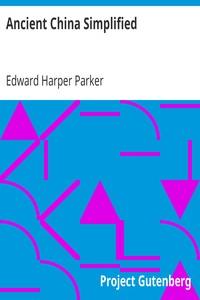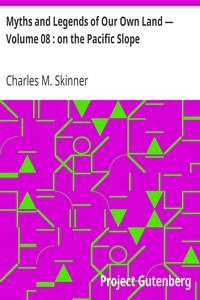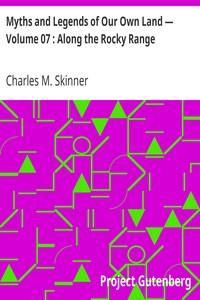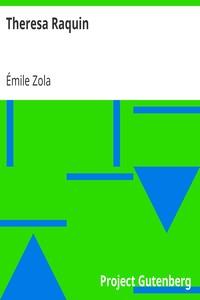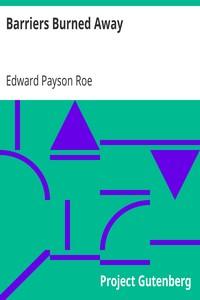|
|
Read this ebook for free! No credit card needed, absolutely nothing to pay.Words: 103307 in 15 pages
This is an ebook sharing website. You can read the uploaded ebooks for free here. No credit cards needed, nothing to pay. If you want to own a digital copy of the ebook, or want to read offline with your favorite ebook-reader, then you can choose to buy and download the ebook.

: Ancient China Simplified by Parker Edward Harper - China; China History Children's History@FreeBooksTue 06 Jun, 2023 Character of the early colonizing Chinese satraps--Revolt of the western satrap and flight of the Emperor in 842 B.C.--Daughter of a later satrap marries the Emperor--Tartars mix up with questions of imperial succession and kill the Emperor--Transfer of the imperial metropolis from Shen Si to Ho Nan--The Chou dynasty, dating from 1122 B.C.--Before its conquest, the vassal house of Chou occupied the same relation to the imperial dynasty of Shang that the Wardens of the Western Marches, or Princes of Ts'in, did in turn to the imperial dynasty of Chou--The Shang dynasty had in 1766 B.C., for like reasons, supplanted the Hia dynasty-No events of great interest recorded in limited area of China before 771 B.C.--Decline of the imperial power until its extinction in 250 B.C.--The Five Tyrant or Protector period--Natural movement to keep pace with political development--Easier system of writing-- Development of trade and industry--Living interests clash with extinct aspirations--From 722 B.C. to 480 B.C. is the period of change covered by Confucius' history The collapse of the Emperor led to restlessness in the south too-- The Jungle country south of the River Han--Ancient origin of its kings--Claim to equality--Buffer state to the south--Ruling caste consisted of educated Chinese--Extension of the Ts'u empire-- Annamese connections--Claims repeated 704 B.C.--Capital moved to King-thou Fu near Sha-sh?--First Ts'u conquests of China--Five hundred years of struggle with Ts'in for the possession of all China How far is history true?--Confucius and eclipses--Evidence notwithstanding the destruction of literature in 213 B.C.-- Retrospective calculations of eclipses and complications of calendars--Eclipse of 776 B.C.--Errors in Confucian history owing to rival calendars Paraphernalia of warfare--Ten thousand and one thousand chariot states--Use of war-chariots, leather or wood--Chariots allotted according to rank--Seventy-five men to one cart--War-chariots date back to 1800 B.C.--Tartar house-carts--Rivers mostly unnavigable in north--Introduction of canals and boat traffic--Population and armies--Vague descriptions--Early armies never exceeded 75,000 men--The use of flags--Used in hunting as well as in war--Victims sacrificed to drums--A modern instance of this in 1900 A.D. The first Hegemon or Protector of China and his own vassal kingdom of Ts'i--Limits of Ts'i and ancient course of the Yellow River-- Absence of ancient records--Shiftings of capital in the ninth century B.C.--Emperor's collapse of 842 and its effect upon Ts'i-- Aid rendered by Ts'i in suppressing the Tartars--Inconsiderable size of Ts'i--Revenges a judicial murder two centuries old--Rapid rise of Ts'i and services of the statesman--philosopher Kwan-tsz-- The governing caste in China--Declares self Protector of China 679 B.C.--Tartar raids down to the Yellow River in Ho Nan-Chinese durbars and the duties of a Protector--Ts'in and Ts'u too far off or too busy for orthodox durbars--Little is now known of the puppet Emperor's dominions--Effeminate character of all the Central Chinese orthodox stales--Fighting instincts all with semi- Chinese states--Struggle for life becoming keener throughout China Sanctity of envoys--Rivalry of Tsin north and Ts'u south for influence over orthodox centre--The state of CH?NG --The state of Sung --Family sacrifices-- Instances of envoy treatment--The philosopher Yen-tsz: his irony-- The statesman Tsz-ch'an of CH?NG--Ts'u's barbarous and callous conduct to envoys--Greed for valuables among high officers-- squabble for precedence at Peace Conference--Confucius manipulates history--Yen-& and Confucius together at attempted assassination Death of First Protector and his henchman Kwan-tsz, 648-643 B.C.-- Ts'i succession and Sung's claim to Protectorate--Tartar influence in Ts'i--Ts'u's claim to the hegemony--Ridiculous orthodox chivalry--Great development of Tsin--A much-married ruler-- Marriage complications--Interesting story of the political wanderings of the Second Protector--Tries to replace Kwan-tsz deceased--Pleasures of Ts'i life--Mean behaviour of orthodox princes to the Wanderer--Frank attitude of Ts'u--Successive Tartar-born rulers of Tsin, and war with T&n--Second Protector gains his own Tsin throne--Puppet Emperor at a durbar--Tsin obtains cession of territory--Triangular war between the Powers-- Description of the political situation--China 2500 years ago beginning to move as she is now doing again I'Jo religion except natural religion--Religion not separate from administrative ritual--The titles of "King" and "Emperor"--Prayer common, but most other of our own religious notions absent--Local religion in barbarous states--Distinction between loss and annihilation of power--Ducal rank and marquesses--Distinction between grantee sacrifices and personal sacrifices--Prayer and the ancient Emperor Shun, whose grave is in Hu Nan--Chou Emperor's sickness and brother's written prayer--Offers to sacrifice self-- Messages from the dead--Lao-tsz's book--Ts'in and conquered Tsin Sacrifices--Further instances of prayer Ancestral tablets carried in war-Shrines graduated according to rank--Description of shrines--Specific case of the King of Ts'u-- Instance of the First August Emperor much later--Temple of Heaven, Peking, and the British occupation of it--Modern Japanese instance of reporting to Heaven and ancestors--Tsin and Ts'i instances of it--Sacrificial tablets--Writing materials--Lu's special spiritual status--Desecration of tombs and flogging of corpses--Destruction of ancestral temples--Imperial presents of sacrificial meat-- Fasting and purification--Intricate mourning rules. So-65 History of Tsin and the Bamboo Annals discovered after 600 years' burial--Confirmatory of Confucius' history--Obsolete and modern script--Ancient calendars--Their evidence in rendering dates precise--The Ts'in calendar imposed on China--Rise of the Ts'in power--Position as Protector--Vast Tartar annexations by Ts'in-- Duke Muh of Ts'in and Emperor Muh of China--Posthumous names-- Discovery of ancient books--Supposed travels of Emperor Muh to Tartary--Possibility of the Duke Muh having made the journeys-- Ts'in and Tsin force Tartars to migrate--Surreptitious vassal "emperors"--Instances of Annam and Japan--Tsin against Ts'in and Ts'u after Second Protector's death--Ts'i never again Protector-- Ts'in's Chinese and Tartar advisers--Foundations for Ts'in's future empire. The Five Protectors of China more exactly defined--No such period as the "Five Tyrant period" can be logically accepted as accurate-- Chinese never understand the principles of history as distinct from the detailed facts--International situation defined--Flank movements--Appearance of barbarous Wu in the Chinese arena-- Phonetic barbarian names--The State of Wei--Enlightened prince envoy to China from Wu--Wu rapidly acquires the status of Protector--Confucius tampers with history--Risky position of the King of Wu--Y?eh conquers Wu, and poses as Protector--The River Sz . Further explanations regarding the grouping of states, and the size of the smallest states--Statesmen of all orthodox states acquainted with one another--No dialect difficulties in ancient times--Records exist for everything--Absence of caste, but persistence of the hereditary idea--The great political economist Kwan-tsz--Tsz-ch'an, the prince-statesman of Cheng--Shuh Hiang, statesman of Tsin--Reference to Appendix No. r--The statesman Yen- tsz of Ts'i--Confucius' origin as a member of the royal Sung family--Confucius' wanderings not so very extensive--Confucius no mere pedant, but a statesman and a humorist--Hiang Suh of Sung, inventor of "Hague" Conferences--Ki-chah, prince-envoy of Wu--K'u- peh-yuh, an authority in Wei--Ts'in had no literary men--Lao-% of Ts'u--Reasons why Confucius does not mention him Free books android app tbrJar TBR JAR Read Free books online gutenberg More posts by @FreeBooks
: Myths and Legends of Our Own Land — Volume 08 : on the Pacific Slope by Skinner Charles M Charles Montgomery - Folklore United States@FreeBooksTue 06 Jun, 2023

: Myths and Legends of Our Own Land — Volume 07 : Along the Rocky Range by Skinner Charles M Charles Montgomery - Folklore United States@FreeBooksTue 06 Jun, 2023
|
Terms of Use Stock Market News! © gutenberg.org.in2025 All Rights reserved.

